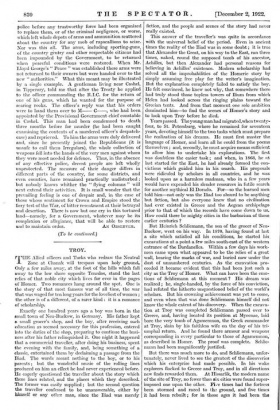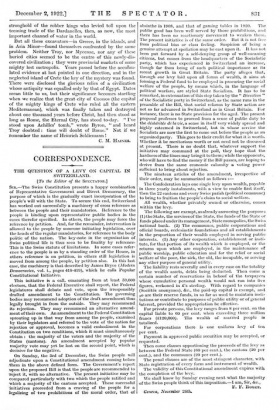TROY. T HE Allied officers and Turks who redraw the Neutral
Zone at Chanak will trespass upon holy ground. Only a few miles away, at the foot of the hills which fall away to the low shore opposite Tenedos, stand the last relics of that noble city which lives for ever in the pages of Homer. Two romances hang around the spot. One is the story of that most famous war of all time, the war that was waged for ten long years for the loveliest of women ; the other is of a different, of a rarer kind : it is a romance of scholarship.
Exactly one hundred years ago a boy was born in the small town of Neu-Buckow, in Germany. His father kept a small grocer's shop, and the boy, after receiving such education as seemed necessary for this profession, entered into the duties of the shop, preparing to continue the busi- ness after his father relinquished it. One night it happened that a commercial traveller, after doing his business, spent the evening with the family, and, being something of a classic, entertained them by declaiming a passage from the Iliad. The words meant nothing to the boy, or to his parents ; but the wonderful music of the rolling lines produced on him an effect he had never experienced before. He eagerly questioned the traveller about the story which these lines related, and the places which they described. The former was easily supplied ; but the second question the traveller confessed to be unanswerable, either by himself or any other man, since the Iliad was merely fiction, and the people and scenes of the story had never really existed.
This answer of the traveller's was quite in accordance with the universal belief of the period. Even in ancient times the reality of the Iliad was in some doubt ; it is true that Alexander the Great, on his way to the East, ran three times, naked, round the supposed tomb of his ancestor, Achilles, but then Alexander had personal reasons for believing in Achilles' existence. Modern scholarship had solved all the improbabilities of the Homeric story by simply assuming free play for the writer's imagination.
But the explanation completely failed to satisfy the boy.
He felt convinced, he knew not why, that somewhere there had truly stood those topless towers of Ilium from which Helen had looked across the ringing plains toward the Grecian tents. And from that moment one sole ambition dominated him—to find the scenes of Homer's story and to look upon Troy before he died.
Years passed. The you rig man had migrated,when twenty- four, to St. Petersburg, where he remained for seventeen years, devoting himself to the two tasks which must prepare the realization of his dreams. He must first master the language of Homer, and learn all he could from the poems themselves ; and, secondly, he must acquire means sufficient to allow him to undertake his explorations. The first was doubtless the easier task ; and when, in 1863, he at last started for the East, he had already formed the con- victions which guided him in his search. His proposals were ridiculed by scholars in all countries, and he was looked upon as a harmless madman, who in a few years would have expended his slender resources in futile search for another mythical El Dorado. For—so the learned men told him—not only was the Mad too absurd to be anything but fiction, but also everyone knew that no civilizatiou had ever existed in Greece and the Aegean archipelago prior to that of which the records have come down to us. How could there be mighty cities in the barbarism of those earlier centuries ?
But Heinrich Schliemann, the son of the grocer of Neu- Buckow, went on his way. In 1870, having found at last a site which satisfied all his conditions, he started his excavations at a point a few miles south-east of the western entrance of the Dardanelles. Within a few days his work- men came upon what appeared to be the relics of a great wall, bearing the marks of war, and buried now under the dust of unnumbered centuries. As the excavation pro- ceeded it became evident that this had been just such a city as the Troy of Homer. What can have been the emo- tions of Schliemann at this moment ? His dream was realized ; he, single-handed, by the force of his conviction, had refuted the hitherto unquestioned belief of the world's scholars. But his crowning achievement was yet to come, and even when that was done Schliemann himself did not know the whole extent of his discovery. When the excava- tion at Troy was completed Schliemann passed over to Greece, and, having located its position at Mycenae, laid bare the very tomb of Agamemnon, the Greek commander at Troy, slain by his faithless wife on the day of his tri- umphal return. And he found there armour and weapons corresponding in every particular to those of Agamemnon,' as described in Homer. The proof was complete. Schlie- mann had been magnificently justified.
But there was much more to do, and Schliemann, unfor. tunately, never lived to see the greatest of the discoveries which his enterprise had made possible. In his wake explorers flocked to Greece and Troy, and in all directions new finds rewarded them. At Ilissarhi, the modern name of the site of Troy, no fewer than six cities were found super-. imposed one upon the other. Fibre times had the fortress been stormed and razed to the ground, and five times it had been rebuilt ; for in those ages it had been the stronghold of the robber kings who levied toll upon the teeming trade of the Dardanelles, then, as -now, the most important channel of water in the world.
But all these excavators—in Greece, in the islands, and in Asia Minor—found themselves confronted by the same problem. Neither Troy, nor Mycenae, nor any of these buried cities seemed to be the centre of this newly-dis- covered civilization ; they were provincial markets of some mighty lost metropolis. Years passed before the accuir ni- lated evidence at last pointed in one direction, and in the neglected island of Crete the key of the mystery was found. There were disclosed the glorious relics of a civilization whose antiquity was equalled only by that of Egypt. Dates mean little to us, but their significance becomes startling when we realize that the great city of Cnossos (the capital of the mighty kings of Crete who ruled all the eastern Mediterranean), which was finally taken and destroyed about one thousand years before Christ, had then stood as long as Rome, the Eternal City, has stood to-day. "I've stood upon Achilles' tomb," wrote Byron, "and heard Troy doubted : time will doubt of Rome." Not if we remember the name of Heinrich Schliemann C. M. ETADMS.







































































 Previous page
Previous page